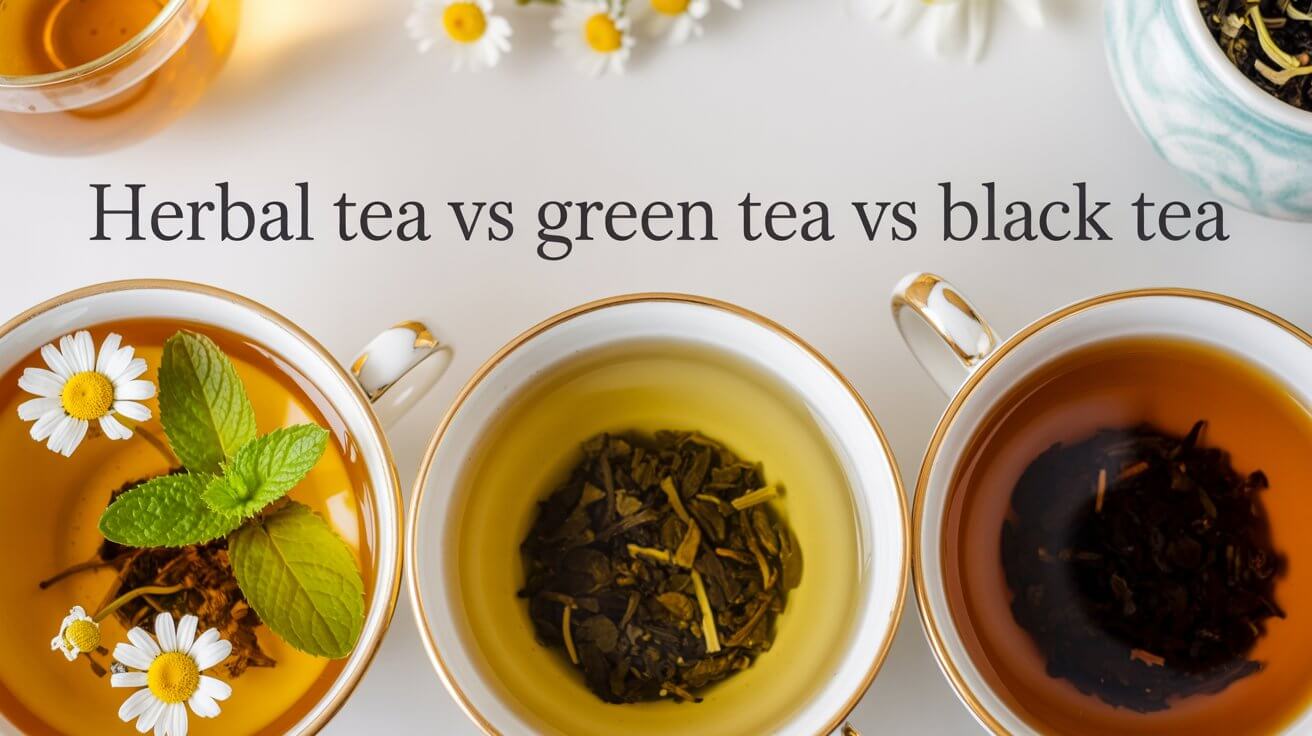Tea remains one of the world’s most consumed beverages, second only to water. Whether you’re sipping for energy, focus, or relaxation, the choice between herbal tea vs green tea vs black tea can feel overwhelming especially since each one offers distinct benefits, flavors, and health effects.
As of 2025, tea culture has evolved beyond tradition consumers are now looking for science-backed wellness benefits, sustainable sourcing, and caffeine-balanced options. In this guide, we’ll unpack how these three tea types differ in origin, caffeine, antioxidants, and best uses with insights on how to choose the right tea for your body and lifestyle.
What Is Herbal Tea? (The Caffeine-Free Choice for Calm & Wellness)
Unlike green and black tea, herbal tea (or tisane) doesn’t come from the Camellia sinensis plant. Instead, it’s made from dried herbs, flowers, fruits, and roots. Think of it as a botanical infusion rather than a traditional tea.
Key Traits of Herbal Tea:
-
Caffeine-Free: Ideal for evenings or anyone avoiding stimulants.
-
Flavor Variety: Ranges from floral (chamomile) and fruity (hibiscus) to minty (peppermint).
-
Functional Benefits: Depending on the herb, it can aid sleep, digestion, hydration, or stress relief.
Expert insight: Herbal teas are naturally hydrating and gentle on digestion. Unlike caffeinated teas, they don’t interfere with sleep cycles, making them perfect for a bedtime ritual.
Pro Tip (Visual Idea): Add a comparison chart showing caffeine levels in different herbal teas for example, chamomile (0 mg), peppermint (0 mg), and rooibos (0 mg).
What Is Green Tea? (The Metabolism and Antioxidant Powerhouse)
Green tea is a “true” tea derived from the Camellia sinensis plant but it’s minimally oxidized, meaning the leaves retain their natural green hue and delicate nutrients.
Key Traits of Green Tea:
-
Caffeine Level: Moderate less than black tea, more than herbal.
-
Flavor Profile: Fresh, grassy, slightly bitter when over-steeped.
-
Health Benefits: Rich in EGCG antioxidants, supports metabolism, boosts focus, and promotes cardiovascular wellness.
Why It Matters (2025 Insight):
According to recent tea market analyses, green tea remains the most popular choice among wellness enthusiasts for weight management and energy balance. Many people now prefer matcha, a powdered form of green tea that delivers higher antioxidant concentration and smoother caffeine release than regular brews.
User Experience Tip: If you’re sensitive to caffeine, try steeping green tea for a shorter time (1–2 minutes) to reduce its intensity while keeping flavor intact.
What Is Black Tea? (The Bold Classic for Focus & Energy)
Black tea, also from Camellia sinensis, undergoes full oxidation, giving it a deeper color and more robust flavor than green tea. It’s the most widely consumed tea globally often enjoyed as a morning or afternoon pick-me-up.
Key Traits of Black Tea:
-
Caffeine Level: Higher than green tea (but less than coffee).
-
Flavor Profile: Bold, malty, sometimes smoky or citrusy (depending on variety).
-
Health Benefits: Improves alertness, supports digestion, and may enhance heart health.
Expert Note: Regular black tea drinkers often report improved focus without the jitteriness of coffee, thanks to L-theanine, an amino acid that balances caffeine’s effects.
Popular Types: English Breakfast, Earl Grey, Assam, and Darjeeling.
Herbal Tea vs Green Tea vs Black Tea — Side-by-Side Comparison
| Feature | Herbal Tea | Green Tea | Black Tea |
|---|---|---|---|
| Origin | Herbs, flowers, fruits | Camellia sinensis (light oxidation) | Camellia sinensis (full oxidation) |
| Caffeine | None | Low–Moderate | Moderate–High |
| Flavor | Floral, fruity, minty, spiced | Fresh, grassy, slightly bitter | Bold, malty, robust |
| Best Time to Drink | Anytime, especially evening | Morning or midday | Morning or afternoon |
| Health Focus | Relaxation, hydration, herbal balance | Antioxidants, metabolism, gentle energy | Energy, digestion, focus |
| 2025 Trend Insight | Popular for caffeine-free detox blends | Core ingredient in wellness and matcha teas | Classic energy drink alternative |
Which Tea Should You Choose in 2025?
The right tea depends on your goals:
-
For relaxation and better sleep: Go for herbal teas like chamomile or rooibos.
-
For metabolism and antioxidants: Choose green tea or matcha.
-
For energy and productivity: Black tea delivers a clean, lasting caffeine boost.
Blended Teas Are Trending:
Many tea lovers now prefer blends that combine the best of all three categories. For instance, All Day Slimming Tea merges herbal ingredients with green tea extracts to support metabolism, digestion, and hydration without harsh diuretic effects.
You can learn more about these functional blends on alldayslimmingtea.blog.
Additional Questions People Ask
1. Is herbal tea better than green tea for hydration?
Yes because herbal teas are caffeine-free, they support pure hydration without mild water loss that caffeine can cause.
2. Which tea is best for weight loss?
Green tea (especially matcha) is the top choice due to catechins that enhance fat metabolism. Herbal teas with ginger or dandelion can complement this effect.
3. Can you mix herbal and green tea?
Absolutely. Combining both can balance energy and relaxation many slimming and detox blends use this approach.
Conclusion
When comparing herbal tea vs green tea vs black tea, each brings its own strengths:
-
Herbal tea for relaxation and hydration.
-
Green tea for antioxidants and metabolism.
-
Black tea for energy and focus.
As of 2025, tea lovers are embracing blends that merge these benefits creating balanced, functional beverages for both wellness and enjoyment. Whether you’re after calm evenings or productive mornings, there’s a perfect cup waiting for you.


Leave a Reply